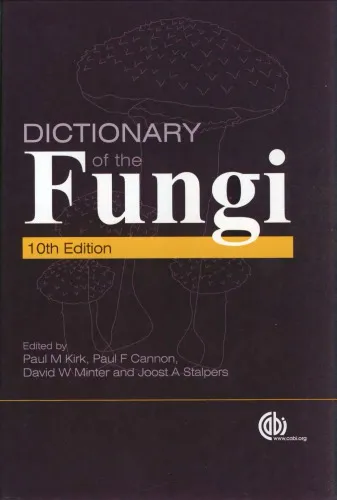Dictionary of the Fungi
4.5
Reviews from our users

You Can Ask your questions from this book's AI after Login
Each download or ask from book AI costs 2 points. To earn more free points, please visit the Points Guide Page and complete some valuable actions.Introduction to the Dictionary of the Fungi
The Dictionary of the Fungi, edited by P.M. Kirk, P.F. Cannon, D.W. Minter, and J.A. Stalpers, stands as one of the most authoritative and comprehensive reference works in the field of mycology. As fungi represent a vast kingdom of organisms with unique ecological, medical, and industrial significance, this book serves as an invaluable resource for students, researchers, and practitioners alike. With its extensive collection of over 20,000 entries detailing fungal species, taxonomic hierarchies, biochemical properties, and ecological roles, this dictionary forms the bedrock of modern fungal studies.
While fungi might once have been dismissed as a simple offshoot of the plant kingdom, discoveries over the past century have painted a far richer and more intricate picture. Fungi contribute to everything from soil regeneration and nutrient cycling to breakthroughs in biotechnology and medicine. The Dictionary of the Fungi encapsulates this complexity, offering readers a complete guide to fungal diversity and all its scientific dimensions.
Detailed Summary of the Book
The Dictionary of the Fungi provides a full taxonomy of the fungal kingdom, including ascomycetes, basidiomycetes, zygomycetes, and other lesser-known groups such as chytrids and glomeromycetes. The text organizes fungal genera alphabetically and supplies concise descriptions of their biology, morphology, and distribution. Beyond taxonomy, the dictionary delves into vital topics such as fungal physiology, phylogeny, evolutionary history, and nomenclature.
Included throughout are updates reflecting the latest research. Many fungal genera have undergone reclassification, and this book ensures readers have access to the current, recognized scientific terminology—critical for maintaining precision in fields that rely on fungi, including molecular biology, agriculture, and forestry. The book doesn’t limit itself to technical classifications; it also explores fungi's ecological roles, such as symbiosis with plants, contributions to decomposition, and pathogenicity in plants and animals.
The scope extends further to practical applications. From brewing and baking to antibiotics and sustainable agriculture, the utility of fungi is celebrated alongside their biological diversity. The dictionary also highlights challenging topics like fungal disease outbreaks, emerging pathogenic fungi, and their socio-economic impact. Comprehensive yet reader-friendly, this volume invites both experienced specialists and curious newcomers to explore the rich and dynamic world of fungi.
Key Takeaways
- A meticulous and exhaustive catalog of fungal genera, updated with the latest taxonomic revisions.
- Insight into fungal biodiversity, ranging from microscopic species to structured fungi like mushrooms.
- Discussions on biotechnological and medical applications of fungi, including antibiotics and industrial processes.
- Explanations of fungal relationships, such as symbiotic partnerships and parasitic impacts, across ecosystems.
- Nomenclatural updates adhering to the International Code of Nomenclature for algae, fungi, and plants.
Famous Quotes from the Book
"Fungi are one of the most versatile organisms on Earth, capable of thriving in diverse habitats, influencing ecosystems, and contributing profoundly to human welfare."
"Understanding fungal diversity is not merely an academic exercise but a fundamental necessity in addressing global challenges such as food security, biodiversity conservation, and climate change."
"The study of fungi bridges the gap between the cellular and the ecological, with each discovery enriching our broader understanding of life itself."
Why This Book Matters
The significance of the Dictionary of the Fungi extends beyond mycology into a wide array of scientific disciplines. This reference work serves as a cornerstone for research in microbiology, ecology, agriculture, and biotechnology. It provides the tools necessary to identify and classify fungi, paving the way for enhanced exploration of their uses and impacts.
In the age of emerging diseases, environmental crisis, and biotechnological innovation, understanding fungi has never been more crucial. Contemporary researchers depend on accurate classifications and in-depth knowledge of fungal organisms, and this book delivers precisely that. By synthesizing decades of study and updating it with the latest findings, the editors have created a timeless resource for anyone invested in the science of life.
Whether you are a seasoned mycologist, a student beginning your journey in fungal biology, or a professional from a connected field, the Dictionary of the Fungi is an essential tool—both to study the fungal kingdom effectively and to appreciate the intricate roles these remarkable organisms play.
Free Direct Download
You Can Download this book after Login
Accessing books through legal platforms and public libraries not only supports the rights of authors and publishers but also contributes to the sustainability of reading culture. Before downloading, please take a moment to consider these options.
Find this book on other platforms:
WorldCat helps you find books in libraries worldwide.
See ratings, reviews, and discussions on Goodreads.
Find and buy rare or used books on AbeBooks.
1253
بازدید4.5
امتیاز50
نظر98%
رضایتReviews:
4.5
Based on 0 users review
"کیفیت چاپ عالی بود، خیلی راضیام"


